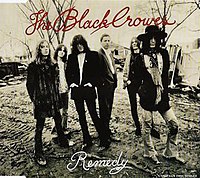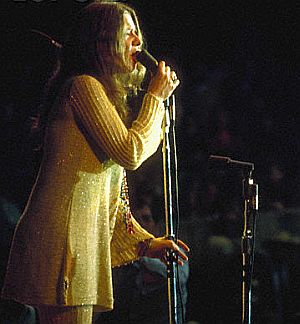 Artist: The Black Crowes
Artist: The Black CrowesSong: "Remedy"
Album: The Southern Harmony And Musical Companion
Year: 1992
CLICK HERE TO LISTEN (will open in new tab)
Often times, the most difficult task for a band can be making a follow up that lives up to the hype after having a massively successful debut. In most cases, the so-called "sophomore slump" occurs, as the band tries to do "too much" and loses sight of why their first record was so successful. This is even more common when the band in question is not playing a mainstream sound, as the second album often moves more towards the popular sound, and is labeled as a "sell out" for this reason. However, there are certain bands that thoroughly understand why people love the music they make, and their formula rarely changes from album to album. After scoring a staggering six hit singles off their 1990 debut, Shake Your Money Maker, there are few bands in history that had as much pressure to deliver an equally powerful follow-up as The Black Crowes. Amazingly, not only did the group meet these expectations, but they surpassed them, as their 1992 record, The Southern Harmony And Musical Companion stands today not only as one of the most impressive sophomore records, but one of the greatest rock albums in history. In an era dominated by gangsta rap and grunge, the album was a breath of fresh air to rock purists, and the success of the record was driven by the lead single, which had a title that could be taken on many different levels: "Remedy."
The overall impact of the song on mainstream music is simply undeniable, as the single spent an amazing eleven weeks at the top of the Billboard Album Rock Tracks chart, powering the album itself to the top of the charts and leading to more than two million copies sold in the U.S. alone. The song instantly proved that The Black Crowes had found many ways to improve on their throwback rock sound that made their debut record so successful, and "Remedy" is a truly joyous musical celebration. Powered by the straightforward and undistorted guitar of Rich Robinson and new guitarist, Marc Ford, the music is so fantastic that it could have fit in just as easily decades earlier when the "jam band" sound was first forming. From the moment the song begins, and the guitar and drums "drop" onto the listener, the band creates an amazingly captivating hard rock groove that is like nothing else in music history. The rhythm section of bassist Johnny Colt and drummer Steve Gorman are equally impressive, yet it is perhaps the piano playing of Eddie Harsch that stands out alongside the guitars. During the bridge sections, Harsch adds amazing fills, and it is his sound that gives the song an "authentic" Southern feel, making it even less like anything else in music. Fusing together the sounds of rock, blues, and even gospel, "Remedy" is one of the finest examples in history of a band moving as a single unit, and this is much the reason the song remains fresh and powerful nearly twenty years after its release.
As fantastic as their music always is, the true soul and spirit behind The Black Crowes always lives in the amazing vocal performance of Chris Robinson. Possessing one of the most instantly recognizable voices in music history, Robinson knows no bounds insofar as vocal range is concerned, and he consistently delivers some of the most high energy and emotional vocal performances ever recorded. "Remedy" is no different, as Robinson moves from preaching to wailing to more "standard" singing, and this diversity in approach makes the song a truly special moment in music history. The song itself is absolutely amazing, as the meaning can be taken on a number of different levels. Though most people see the two most simple, the age old "double meaning" which makes the song speak of either drugs or sex, depending on the listener, there are a number of other meanings that come through, as well as some brilliantly buried lyrical classics. While the Robinson brothers make no attempt to hid the more sexually driven parts of the song, it is lines like, "...baby why's who's who, baby know you too? Tell me did the other children scold on you?" that prove to be some of the finest and deepest lyrics of their generation. As Chris Robinson moves through the song, each change in his vocal approach draws the listener further into the music, and the power and excitement that is created during the run of the song leaves only one choice at the end: listing to it another time.
In an era when "pure rock and roll" was seemingly a lost breed, The Black Crowes held strong to the foundations of rock music and gave the world some of the finest rock records in history. Fusing together the sounds of everyone from Led Zeppelin to The Allman Brothers to The Faces, there was simply no other band of their generation that were quite like The Black Crowes. Perfecting what it meant to have a band move as a single unit, their songs are almost always as lyrically powerful as they are musically superior. Having already established themselves on both ends of the musical spectrum with hits like "Jealous Again" and "She Talks To Angels," there are few bands that have had to endure as much pressure and hype for their second record, and The Black Crowes delivered in full with their 1992 masterpiece, The Southern Harmony And Musical Companion. The albums' lead single, "Remedy" remains a classic of rock music, and its dominance on the charts in an era when the popular trend was a far cry from their sound serves as a testament to the overall greatness of the song as well as the band. Featuring a magnificent interplay between the bands' two guitarists and pianist Eddie Harsch, "Remedy" retains an amazing, deep groove whilst simultaneously standing as one of the finest rock and roll songs in history. Coming as close to true rock perfection as is possible, few will argue that "Remedy" stands alone as not only the finest musical moment for The Black Crowes, but one of the greatest songs ever recorded.












